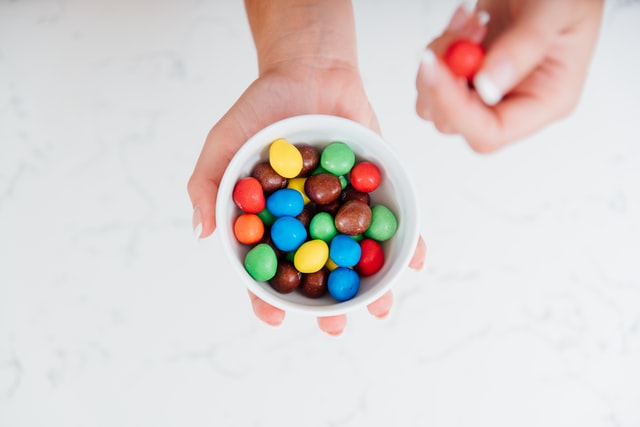It’s something most of us learn early—sugar is terrible for our bodies, and especially for our teeth. But that doesn’t stop us from consuming an average of nearly 100 pounds of sugar via candy, soft drinks, and other sweets and sweeteners each year. As a culture we’re addicted to sugar. This habit adds up to a hefty price tag as we get older. It leads to a mouth full of fillings for some or even to a mouth full of false teeth or worse for others.
At Reno Dental Associates, we want to partner with you to help make 2016 the year you beat the sugar habit. We want our clients to aim for healthier, happier teeth, now and for many years to come.
WHY IS SUGAR BAD FOR OUR TEETH?
To beat the sugar habit, we need to understand what it does to our teeth. It’s a common misconception that sugar itself eats away at tooth enamel and leads to decay. Rather, it’s the acids created by harmful oral bacteria that feed on sugar that destroy our teeth. Less sugar consumption means fewer of these bacteria and a lower level of enamel-eating acidic content in the mouth.
TREAT SUGAR LIKE AN ADDICTION—IT IS
Most experts agree that our biological and psychological responses to sugar bear all of the markers of substance addiction. These include intense urges, increasing frequency of indulgence, withdrawal symptoms like irritability, and an inability to control consumption. If we start to treat sugar consumption like an addictive behavior, we can begin to treat it. We will use the kind of mindset that’s been successful in treating other mild addictions. Try these four strong-arm tactics for curbing cravings, and get on the road to controlling sugar habits for good:
1. Get it out of the house
The success of the out-of-sight, out-of-mind method is well documented. Our senses are powerful persuaders, convincing us to indulge in something that looks, smells, or surely tastes good. Remove sugary treats and soft drinks from the house, and make a household rule against their return. Resolve to say no when someone who doesn’t know the rule offers to bring sugary desserts to dinner, or offers them while you’re out. Tough at first, but like all of these tips, it gets easier over time.
2. Avoid artificial sweeteners
This one surprises most people. Aren’t artificial sweeteners engineered specifically to provide a less damaging alternative to sugar? Yes and no. The conventional thinking has been that artificial sweeteners are preferable to sugar, honey, and high fructose corn syrup because they don’t raise blood sugar levels—a helpful tool for diabetics. But research shows that artificial sweeteners increase your cravings for sugary foods just like sugar does, keeping you in that loop of temptation. More recent studies suggest that the conventional thinking may be flawed, and that some artificial sweeteners seem to change body chemistry, resulting in higher blood sugar levels after all.
3. Use your smarts to trick your sweet tooth
When we talk about curbing sugar consumption, we’re mostly talking about foods and drinks with added sugar. Foods like fruits and some vegetables that contain complex, naturally-occurring sugars provide our bodies with enough nutrition, including fiber, to control blood sugar and curb cravings. When you’re craving treats, reaching for a juicy apple or a soft, sweet banana will help keep the initial temptation at bay, make your body feel more satisfied, and train your sweet tooth to expect—and eventually to crave (really!)—healthier choices.
4. Replace the sugar reward with another equally-satisfying, non-addictive reward
If you’re like a lot of us, you’ve thought of sweets and desserts as a reward for a long day at work, or a job well-done, or even for a successful week of dieting. This trains your mind to work toward the sugar, which reinforces those cravings. And as you’ve likely noticed, we eventually start requiring less and less of ourselves to get to it. Pretty soon, we’ve fallen off the sugar wagon again.
Instead of using candy, cake, ice cream, soft drinks, or other desserts—or food of any kind, for that matter—as a reward for hard work, think of a healthier, non-addicting pleasure to replace it. Grab a friend and go to the movies. Buy a new book. Ditch or delegate a weekend chore. Sleep in!
Developing a mindset of indulgence that isn’t connected to food or unhealthy, addicting behaviors reduces our cravings for those things over time, sometimes drastically, and can put you on the road to being in control of your health.
Too much sugar can be harmful to your teeth. Consult with Reno Dental Associates and frequently get checked up to prevent any cavities.
